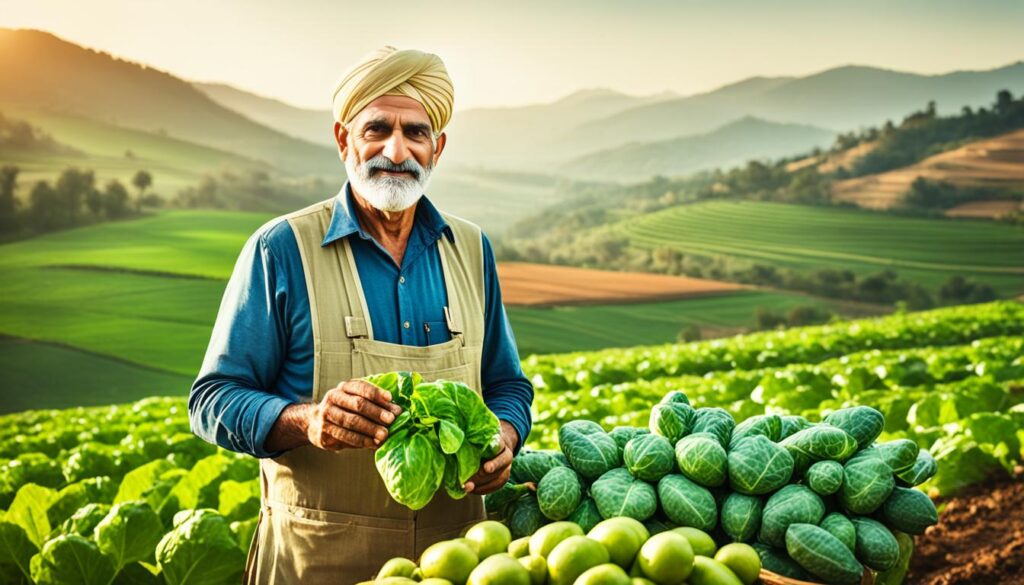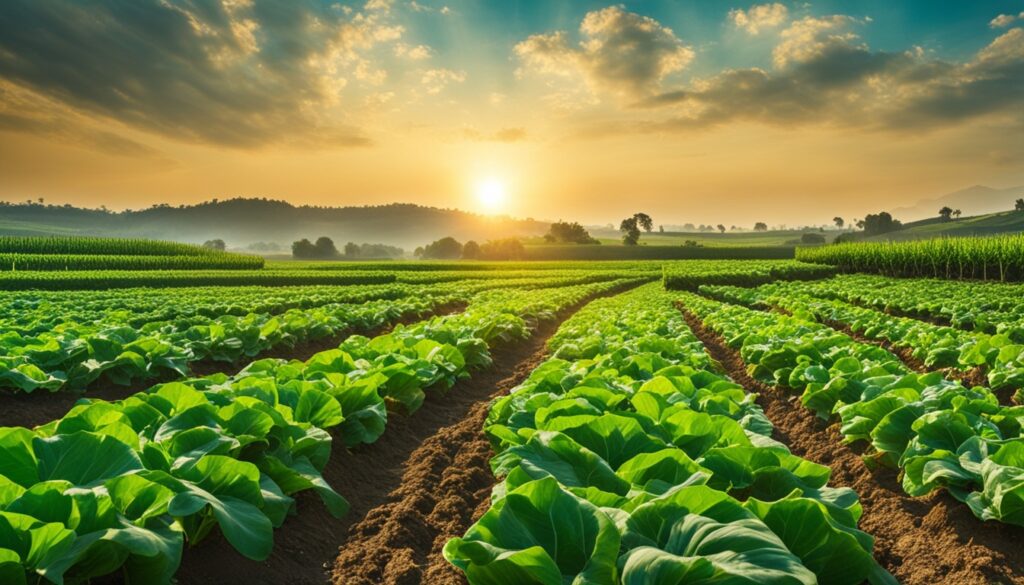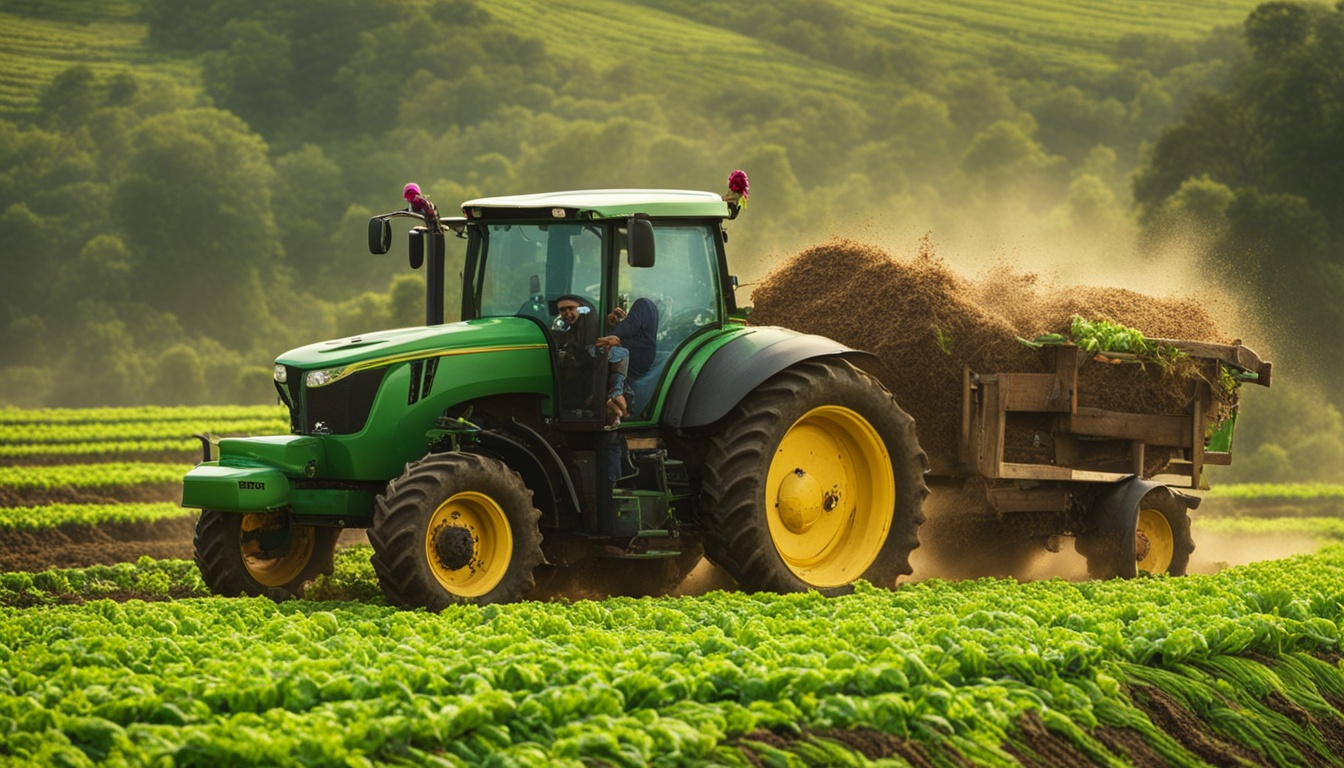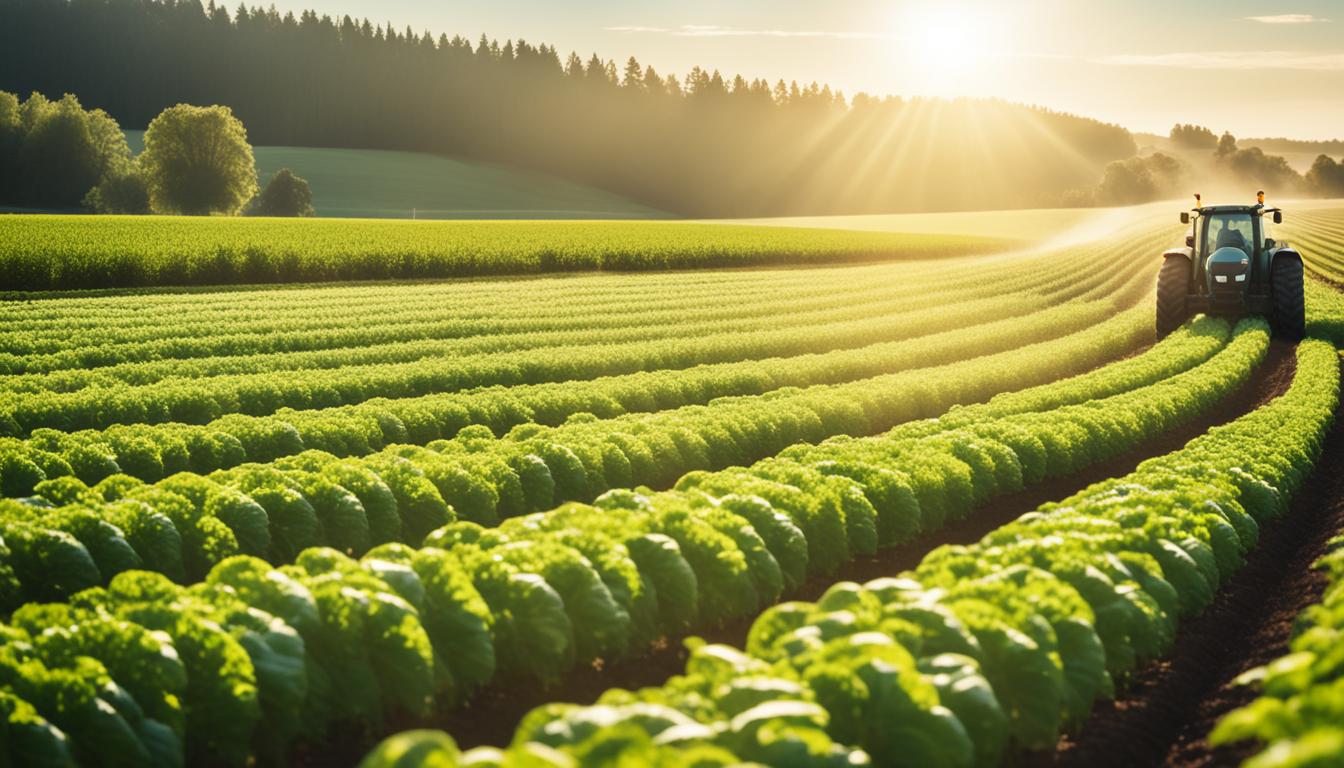India’s farming is changing, and organic farming is getting more attention. Can it really help sustain Indian farming, or is it just for a few? This article looks into the good and bad of organic farming in India’s farming world.
More people want food without chemicals, which has made organic farming popular in India. The government is supporting it too, seeing its benefits for the environment and soil health. But, making organic farming common faces challenges like getting the right inputs, controlling pests, and selling the produce.
This article will explore how organic farming works, its advantages, and the problems it faces. It shows how organic farming can help India by protecting the environment, making soil better, and increasing food production. But, it’s not easy and needs a supportive system for farmers.
Exploring organic farming in India shows its big role in the future of farming here. Join us to see the chances and challenges ahead. We’ll look at if organic farming can really help Indian farming last long.
Can Organic Farming Sustain Indian Agriculture?
As more people in India want organic food, we’re asking if organic farming can help our farms. Traditional farming has been common, but organic farming’s benefits for the environment and health are making people think differently.
India’s farms face many challenges due to its varied climate and soil. Organic farming could be a solution to issues like soil damage, water shortages, and too much chemical use. This has made people interested in sustainable farming again.
- Organic farming can cut down on synthetic fertilizers and pesticides. These can harm the environment and our health.
- It promotes crop rotation, growing different crops together, and natural pest control. This improves soil health and biodiversity, making farming in India more sustainable.
- More people want organic products, both at home and abroad. This shows organic farming could be key to meeting India’s food needs and protecting the environment.
Switching to organic farming isn’t easy, though. We need better access to organic inputs, effective pest control, and strong supply chains. These are important for organic farming to spread widely.
India is looking into how organic farming can help with its farming challenges. Finding a balance between producing more food and protecting the environment is crucial. This will help decide if sustainable farming can work in India long-term.
“The future of Indian agriculture lies in the embracing of sustainable practices that can meet the growing demand for food while preserving the delicate balance of our ecosystems.”
The Rise of Organic Farming in India
In recent years, organic farming has become more popular in India. This is because more people want organic produce. The market for organic food is growing, showing that people are choosing sustainable farming.
Increasing Demand for Organic Produce
More Indians are looking for organic food because of health and environmental concerns. They want to avoid foods with synthetic pesticides and chemicals. This shift is making organic farming more popular.
Reports say the Indian organic food market will grow by over 20% from 2021 to 2026. This shows a big future for organic farming.
Government Initiatives and Policies
- The government sees the value in organic farming and has started many programs to help it grow.
- The National Programme for Organic Production (NPOP) began in 2001. It helps set rules for organic farming and supports its growth.
- The Paramparagat Krishi Vikas Yojana (PKVY) scheme started in 2015. It helps small farmers switch to organic farming with money and technical help.
- The goal is to make 20% of India’s farmland organic by 2025.
Thanks to government support and more people wanting organic food, organic farming is on the rise in India. This is making farming more sustainable and good for the environment.
Organic Farming Practices
Organic farming is all about making agriculture sustainable and caring for the environment. It uses natural methods instead of chemicals. This approach is key to its success. Let’s look at some important practices that are changing Indian farming for the better.
Crop Rotation and Intercropping
Crop rotation is a big part of organic farming. It means growing different crops one after the other on the same land. This keeps the soil healthy by adding nutrients and stopping pests and diseases.
Intercropping is when you grow more than one crop together. It uses the good things plants do for each other. This way, farmers get more from their land.
- Crop rotation helps to replenish soil nutrients and break disease and pest cycles.
- Intercropping allows for the efficient use of available resources and can enhance overall plant productivity.
- These practices contribute to the long-term sustainability of organic farming systems.
Composting and Natural Fertilizers
Organic farmers use composting and natural fertilizers a lot. Composting turns things like plant leftovers and animal manure into a special soil food. Natural fertilizers, like vermicompost and rock phosphate, give plants the nutrients they need without harming the environment.
| Organic Farming Practice | Benefits |
|---|---|
| Composting | Improves soil structure, increases water-holding capacity, and provides a slow-release source of nutrients for plants. |
| Natural Fertilizers | Deliver essential nutrients to plants without the use of synthetic chemicals, promoting overall plant health and soil fertility. |
By using these methods, farmers can grow food in a way that’s good for the earth and healthy for everyone.
“Organic farming is not just a method of production, but a way of life that respects the delicate balance of nature and the health of our planet.”
Sustainable Agriculture in India
As the world faces climate change and environmental issues, sustainable agriculture is key for India’s food future. Organic farming is a big part of this strategy. It focuses on natural inputs and keeping the environment in balance.
Organic farming uses techniques like crop rotation and natural fertilizers. These methods keep the soil healthy and fertile. By avoiding synthetic chemicals, it also protects the soil and water, making farming sustainable for the long term. This benefits farmers and those who eat the food.
The Benefits of Organic Farming for Sustainable Agriculture
- Improved soil health and fertility through the use of organic matter and natural fertilizers
- Reduced water usage and conservation of water resources by minimizing the need for irrigation
- Increased biodiversity and a healthier ecosystem, supporting natural pest control and pollination
- Lower carbon footprint and reduced greenhouse gas emissions compared to conventional farming
- Provision of nutritious, chemical-free food that supports human health and well-being
By adopting sustainable agriculture, India can meet the food needs of its growing population while protecting the environment. Organic farming is a key part of this vision. It offers many benefits for the country’s agriculture.

| Indicator | Conventional Farming | Organic Farming |
|---|---|---|
| Soil Health | Degradation, loss of fertility | Improved soil structure, increased organic matter |
| Water Usage | High water consumption, pollution | Reduced water usage, conservation of resources |
| Biodiversity | Decreased biodiversity, reliance on monocultures | Increased biodiversity, support for natural ecosystems |
| Carbon Footprint | Higher greenhouse gas emissions | Lower carbon footprint, reduced emissions |
| Food Quality | Increased chemical residues, lower nutrient content | Nutritious, chemical-free produce |
“Organic farming is not just a method of production, but a way of life that emphasizes harmony with nature and the sustainable use of natural resources.”
Benefits of Organic Farming
Organic farming brings many benefits for the environment and your land. By avoiding synthetic fertilizers and pesticides, you help the planet and keep your soil healthy. This approach is better for the earth and your land’s future.
Environmental Conservation
Organic farming is key to protecting the environment. It cuts down on harmful chemicals, reducing greenhouse gases and pollution. It also helps keep soil healthy and supports many plants and animals, making ecosystems better.
Improved Soil Health and Fertility
Organic farming focuses on soil health. Using compost and natural fertilizers, farmers make soil richer and more fertile. This means your land will be more productive and sustainable over time.
| Benefits of Organic Farming | Impact |
|---|---|
| Environmental Conservation | Reduced greenhouse gas emissions, improved water quality, and enhanced biodiversity |
| Improved Soil Health and Fertility | Increased nutrient content, better water-holding capacity, and long-term productivity |
“Organic farming is not only good for the environment, but it also helps create a more sustainable future for our land and communities.”
Organic Crop Yields and Productivity
Many people wonder if organic farming can produce as much as traditional farming. But, studies show that organic farming can keep up with crop yields. This proves that organic farming is just as productive as traditional methods.
Researchers have looked into how organic and traditional farming compare. A study in Renewable Agriculture and Food Systems found organic farming was 19.2% behind traditional farming in yields. But, this difference changed a lot based on the crop, farming methods, and the environment.
| Crop Type | Organic Yield Difference |
|---|---|
| Cereals | -9.1% |
| Fruits and Vegetables | -12.0% |
| Legumes | -1.1% |
To improve organic farming, using smart techniques is key. Practices like rotating crops, growing multiple crops together, and using natural fertilizers help. As organic farming grows, new methods and research are making it better.
“Organic farming is not just about avoiding synthetic inputs; it’s about building a resilient, regenerative agricultural system that can thrive in the long run.”
The argument over organic versus traditional farming is ongoing. But, the facts show organic farming can be a good choice for Indian farming. It just needs farmers to use the best methods and get the right support.

Pest Management in Organic Farming
Organic farming is more than avoiding synthetic chemicals. It’s about keeping pests under control in a way that respects nature. Organic farmers use natural methods to manage pests. These methods are good for the environment and keep the farm balanced.
Natural Pest Control Methods
Using beneficial insects is a key part of organic pest control. Ladybugs, lacewings, and parasitic wasps help keep pests away. They eat pests that harm crops, keeping the farm healthy.
Plant-based pesticides are another tool. Neem oil, from the neem tree, is a safe way to fight pests. It doesn’t harm the environment but controls many pests well.
Crop rotation helps too. Changing what you grow breaks pests’ life cycles. Using cover crops and intercropping makes your farm diverse and strong against pests.
“Organic pest management is not just about eliminating pests – it’s about creating a balanced, resilient ecosystem that can naturally suppress pest populations.”
Organic farmers use these natural methods to protect their crops and support their farms. This approach is key to sustainable farming. It keeps organic farming in India strong for the future.
Challenges Faced by Organic Farmers
Organic farming is becoming more popular in India because people want food without chemicals. But, organic farmers face big challenges. They struggle to get organic inputs and find good ways to market and sell their products.
Access to Organic Inputs
Organic farmers have a hard time getting organic seeds, fertilizers, and pest control products. These items are often scarce and expensive. This makes it tough for farmers to switch to organic farming.
To solve this, we need to work on making more organic inputs available and affordable. We also need more government support and subsidies for organic farming.
Marketing and Distribution Channels
Organic farmers also struggle to get their products to consumers. They need to set up good supply chains, find reliable stores, and make their brands known. Since organic products are pricier and not everyone knows about them, it’s hard to grow the market.
Helping organic farmers use digital tools, work together in marketing, and improve their infrastructure can help. This way, they can reach more people who want organic food.
Fixing these issues is key to making organic farming work long-term in India. By supporting organic farmers and growing the organic market, we can enjoy the many benefits of sustainable farming.

“Organic farming is not just a choice, but a necessity for the future of our planet. By overcoming the challenges, we can create a more resilient and sustainable agricultural system.”
Organic Certification and Labeling
In the world of organic farming, organic certification and labeling are key. They help build trust with consumers, grow the organic market, and keep organic products genuine. Let’s explore how these are vital to the organic industry.
Organic certification is managed by groups that set strict rules for organic farming and products. This process checks that products are truly organic. It lets consumers know they’re buying real organic items.
Organic labels show this certification. They are a strong marketing tool and a sign of quality. These labels mean the product was made without harmful chemicals or synthetic stuff.
- Organic certification ensures compliance with organic rules and standards.
- Organic labels help build trust and guide buying choices.
- The organic certification and labeling system is key for the organic market’s growth.
By using organic certification and labels, farmers, producers, and sellers can meet the growing demand for organic products. This supports sustainable farming. The link between organic certification, labels, and market growth is what makes organic farming in India strong.
“Organic certification and labeling are the cornerstones of consumer trust and the organic farming industry’s success.”
Organic Market Trends and Consumer Behavior
The organic market in India has grown a lot in recent years. This growth shows how more people want organic food. They are learning about the health and environmental benefits of organic farming.
This movement is getting stronger. It’s important to look at the trends in both the domestic and export markets for Indian organic farmers.
Domestic and Export Markets
In India, more people are interested in organic food. They care more about health, food safety, and sustainable farming. This has made them pay more for organic products because they know they are better for the planet.
India is also selling organic produce to other countries. Its climate and farming ways make it a great source of organic food. Farmers are making good deals with buyers around the world.
| Organic Market Trends | Domestic Market | Export Market |
|---|---|---|
| Consumer Demand | Increasing awareness and willingness to pay premium prices | Growing global demand for diverse organic crops |
| Market Growth | Steady expansion in recent years | Significant growth potential |
| Key Drivers | Health consciousness, food safety concerns, sustainability | India’s diverse climatic conditions and traditional farming practices |
The organic market is changing fast. Both the domestic and export markets offer great chances for Indian organic farmers. By understanding what consumers want, they can make smart choices. This will help them grow and reach new customers.
Organic Farming and Food Security
The world’s population is growing, making sustainable food sources more important than ever. Organic farming is key to ensuring we have enough food for everyone. It helps make food last longer and improves its quality and nutrition.
Organic farming helps keep the soil healthy and fertile. By using natural fertilizers and rotating crops, farmers keep the land productive without harming it. This means the soil stays fertile, supporting a wide variety of crops and increasing food production.
Organic farms are also more resilient to climate change. They use natural ways to control pests and support many different plants and animals. This helps them survive droughts, floods, and extreme weather, keeping food supplies steady.
Organic farming also makes healthy food available to everyone, especially in poor areas. Without synthetic pesticides, the food is richer in vitamins, minerals, and antioxidants. This makes it better for our health.
“Organic farming is not just a method of production, but a holistic approach to sustainable agriculture that benefits both the environment and human health.”
More people want organic food, which helps organic farmers. This increases investment and support for organic farming. It makes sure there’s enough food for everyone as the population grows.
Using organic farming can help solve food security issues in India. It makes food production sustainable and resilient. This leads to more food for everyone, making the future more secure.
Case Studies and Success Stories
Organic farming is growing fast in India. Successful farmers inspire others with their stories. Ravi Sinha, a farmer in Uttarakhand, started organic farming ten years ago. Now, his farm grows fruits and vegetables like apples, oranges, and leafy greens. These are in high demand locally and in organic markets.
In Kerala, the Organic Farmers’ Cooperative helps small farmers go organic. It gives them organic inputs, training, and support. This has led to higher yields and profits for its members. It proves organic farming can work in India.
These stories show organic farming is good for the economy, the environment, and sustainable agriculture. We hope these stories will inspire others to try organic farming. This will help grow sustainable food production in India.


